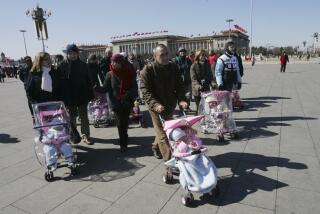U.S. Retools Kidnapping Response
- Share via
WASHINGTON — After lengthy internal debate, the Bush administration Wednesday adopted a more vigorous policy on Americans kidnapped overseas that calls for the government to review every case to decide whether to take an active role.
In the past, the government has gotten involved in all kidnappings of U.S. officials or troops but has sometimes declined to take any role in cases involving private citizens.
Now U.S. officials will consider whether to take actions ranging from simply giving advice in dealing with the abductors to conducting commando-style raids.
“We’ll use every appropriate resource to gain their safe return,” said Richard Boucher, the chief State Department spokesman. “It may be pounding on a foreign ministry door; it may be working with law enforcement authorities. But we’re going to look and see what we can do to get Americans who are being held out of detention.”
The government said it will continue to refuse to pay ransoms or make other concessions to kidnappers, believing such actions would encourage abductions.
A formal statement of the amended policy says that “the U.S. government will make every effort, including contact with representatives of the captors, to obtain the release of hostages, without making concessions to the hostage-takers.”
A “Hostage Subgroup” made up of federal officials will review each case.
The government will continue to discourage private companies from paying ransoms to free American employees. But it will cooperate with companies even if they decide to pay a ransom, officials said.
The review of the policy came at a time of rising concern about hostage-taking, notably the unresolved kidnapping of Wall Street Journal reporter Daniel Pearl. Pearl was kidnapped in Pakistan last month and, despite a wide search, has not been found.
The policy change will have no effect on the handling of that case, Boucher said, though he added that “certainly Mr. Pearl’s fate remains of great concern to us.”
About two dozen Americans are reported kidnapped overseas each year.
In the Philippines, the Abu Sayyaf group of militants is holding American missionaries Gracia and Martin Burnham of Wichita, Kan., as well as Philippine nurse Deborah Yap.
Oreta Burnham, mother of Martin Burnham, told Associated Press that she approved of the government’s new policy.
“We think it’s a very good policy. We think it will help people in the future,” she said.
Boucher sought to minimize the significance of the change, saying it was “a restatement of pretty much the same policy.” He described differences among government agencies involved in drafting the policy as minimal.
But Pentagon officials were concerned that a more visible role by the government could encourage kidnappings, one official said. He said the Pentagon advised caution in ordering any military action.
Boucher emphasized that military action is not always the preferred solution and that many cases are best left to local authorities. But he said a more visible role by the U.S. government could bring more criminals to justice and deter future abductions.
Kidnappers may be encouraged to “go on from one crime to another if they keep getting away with it,” he said.
Also motivating the change was concern for victims and a realization that the cases “impact our foreign policy,” Boucher said.
The policy review was begun in the final days of the Clinton administration. Officials from the White House, State Department, Pentagon, CIA and FBI took part in the discussions.
Last year, an oil consortium reportedly paid $13 million to free seven foreign oil workers, including four Americans, in Ecuador. The governments of Ecuador and Colombia later arrested 57 people alleged to be the kidnappers and said they had also been responsible for several previous abductions.
More to Read
Sign up for Essential California
The most important California stories and recommendations in your inbox every morning.
You may occasionally receive promotional content from the Los Angeles Times.













